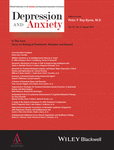RANDOMIZED TRIAL OF D-CYCLOSERINE ENHANCEMENT OF COGNITIVE-BEHAVIORAL THERAPY FOR PANIC DISORDER
Financial Disclosures:
Dr. Otto reports serving, in the last 3 years, as a paid consultant for MicroTransponder Inc., Concert Pharmaceuticals, and ProPhase, providing expert consensus opinion for Otsuka Pharmaceuticals, receiving royalty support for use of the SIGH-A from ProPhase, receiving book royalties from Oxford University Press, Routledge, and Springer, and receiving research support for other projects from NIH.
Dr. Pollack reports serving on the advisory board or consulting for Clintara, Concert Pharmaceuticals, Corcept Therapeutics, Edgemont Pharmaceuticals, Eli Lilly, Ironwood Pharmaceuticals, Medavante, Merck, Palo Alto Health Sciences, and Project Plus, receiving equity from Doyen Medical, Medavante, Mensante Corporation, Mindsite, and Targia Pharmaceuticals, and receiving royalties/patents for SIGH-A and SAFER interviews.
Dr. Dowd reports receiving research funding from Pfizer, Janssen and Edgemont Pharmaceuticals and serves as a paid consultant with Clintara and Otsuka Pharmaceutical.
Dr. Hofmann receives support from NIH/NCCIH (R01AT007257), NIH/NIMH (R01MH099021, R34MH099311, R34MH086668, R21MH102646, R21MH101567, K23MH100259), and the Department of the Army for work unrelated to the studies reported in this article. He receives compensation for his work as an advisor from the Palo Alto Health Sciences and Otsuka America Pharmaceutical, Inc., and for his work as a Subject Matter Expert from John Wiley & Sons, Inc. and SilverCloud Health, Inc. He also receives royalties and payments for his editorial work from various publishers.
Dr. Pearlson and Ms. Szuhany report no conflicts.
Dr. Gueorguieva reports consulting for Palo Alto Health Sciences.
Dr. Krystal consults for AbbVie, AMGEN, Astellas Pharma Global Development, AstraZeneca Pharmaceuticals, Biomedisyn Corporation, Bristol-Myers Squibb, Eli Lilly and Co, Euthymics Bioscience and Neurovance (a subsidiary of Euthymic Bioscience), Forum Pharmaceuticals, Janssen Research and Development, Lundbeck Research USA, Novartis Pharma AG, Otsuka America Pharmaceutical, Sunovion Pharmaceuticals, and Takeda Industries. J.H.K. is on the scientific advisory board for Lohocla Research Corporation, Mnemosyne Pharmaceuticals, Naurex, and Pfizer Pharmaceuticals. J.H.K. holds stock in Biohaven Medical Sciences, and stock options in Mnemosyne Pharmaceuticals. J.H.K. holds three patents/inventions: (1) US Patent 5 447 948 (September 5, 1995); (2) US Patent 8 778 979 B2 (July 15, 2014); and (3) US application 14/197 767 filed on March 5, 2014; United States application or PCT international application 14/306 382 filed on June 17, 2014. In addition, Dr. Krystal was supported by the Yale Center for Clinical Investigation (UL1RR024139), US Department of Veterans Affairs via its support for the National Center for Post Traumatic Stress Disorder and Consortium to Alleviate PTSD, and the US National Institute on Alcohol Abuse and Alcoholism (P50AA012879).
Dr. Simon reports research grants from the American Foundation for Suicide Prevention, Department of Defense, Highland Street Foundation, and NIH; speaking/CME/consulting from the MGH Psychiatry Academy and Pfizer Pharmaceuticals, and spousal equity from G Zero and Gatekeeper.
Dr. Tolin reports receiving research funding from Palo Alto Health Sciences, Inc.
Clinical Trials Registry Name: Exposure, D-Cycloserine Enhancement, and Genetic Modulators in Panic Disorder (DCSPanic).
Clinical Trials URL: https://clinicaltrials.gov/ct2/show/NCT00790868
Clinical Trials Registry Number: NCT00790868.
Contract grant sponsor: NIMH; Contract grant numbers: R01-MH081116, R01-MH081132, R01-MH081130.
Abstract
Background
Initial studies have provided a mixed perspective of the efficacy of d-cycloserine (DCS) for augmenting the efficacy of exposure-based cognitive behavioral therapy (CBT) for panic disorder. In this multicenter trial, we examine the magnitude of DCS augmentation effects for an ultra-brief program of CBT.
Methods
We conducted a double-blind, controlled trial at three treatment sites, randomizing 180 adults with a primary diagnosis of panic disorder to five sessions of treatment, with study pill (50 mg DCS or matching placebo) administered 1 hr prior to the final three sessions. Two booster sessions were subsequently provided, and outcome was assessed at posttreatment and 1-month, 2-month, and 6-month follow-up assessments. The primary outcome was the degree of reduction in the Panic Disorder Severity Scale. Additional analyses examined the role of severity and current antidepressant or benzodiazepine use as moderators of DCS augmentation effects.
Results
DCS augmentation resulted in significant benefit only early in the trial, with no beneficial effects of DCS augmentation evident at follow-up evaluations. We did not find that baseline severity or antidepressant or benzodiazepine use moderated DCS efficacy, but benzodiazepine use was associated with lower efficacy of CBT regardless of augmentation condition.
Conclusions
Consistent with other recent multicenter trials, the benefit of DCS was less than indicated by pilot study and reflected an acceleration of treatment response evident at treatment endpoint, but no advantage in response over follow-up evaluation. Our results did not support severity or concomitant medication moderators observed in previous trials of DCS augmentation.




